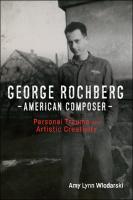George Rochberg, American Composer
Personal Trauma and Artistic Creativity
Abstract
Based on private diaries, correspondence, and unpublished writings, George Rochberg, American Composer, reveals the impact of personal trauma on the creative and intellectual work of a leading postmodern composer. George Rochberg, American Composer, is the first comprehensive study devoted to tracing and putting into a rich cultural context the career of George Rochberg, widely acknowledged as one of the most prominent musical postmodernists. Drawing from unpublished materials including diaries, letters, sketches, and personal papers, the book traces the impact of two specific personal traumas--Rochberg's service as an infantryman in World War II and the premature death of his son--on his work as a leading composer, college educator, and public intellectual. The book significantly expands our understanding of Rochberg's creative work by reconstructing and examining the earliest seeds of his aesthetic thinking--which took root while he served in Patton's Third Army--and following their development through his mature compositional period into the final stages of his long career. It argues that Rochberg's military service was a transformative life experience for the young humanist, one that crucially shaped his worldview and influenced his artistic creativity for the next sixty years. As such it reveals personal trauma and aesthetic recovery to be the basis of Rochberg's postwar ideas about humanism, musical quotation, and neotonality. This book is available as an Open Access eBook under the Creative Commons license: CC-BY-NC. Support for this publication was provided by the Howard Hanson Institute for American Music at the Eastman School of Music at the University of Rochester.


 Download
Download Download
Download